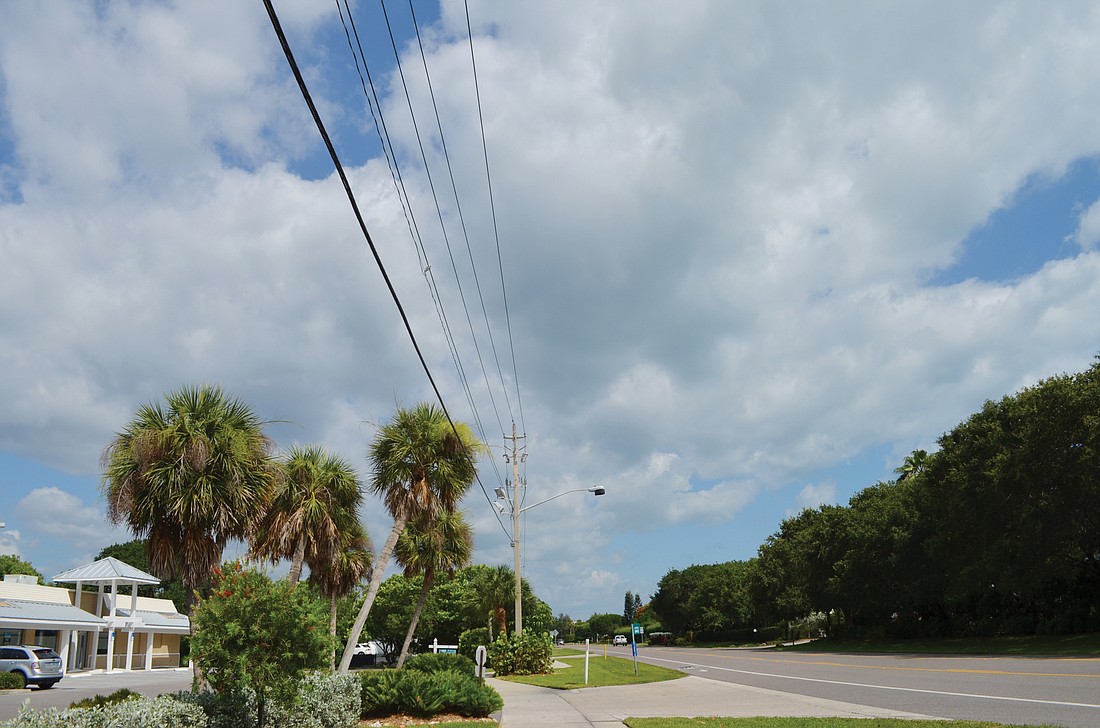- July 26, 2024
-
-
Loading

Loading

The Longboat Key Town Commission flipped the switch on underground utilities.
In November, the town’s electorate will vote on a $23.4 million project to bury utilities on Gulf of Mexico Drive. If voters approve it, a second referendum will follow in March for an $18.8 million project to bury utilities Keywide — but only those property owners who don’t currently have underground utilities will cast a ballot.
At its Monday night regular meeting, the commission gave town staff direction in a 6-0 vote to draft ordinances for two separate referenda questions that residents will vote on in separate elections. Commissioner Pat Zunz was absent for the vote that occurred just before 11 p.m.
Commissioners chose a pair of non-ad valorem funding options to fund the project from five sets of choices before them.
The town had the option of funding the projects through ad valorem (uniform millage rate funding through property taxes like beach millage districts) or non-ad valorem assessments (property assessments that are collected through tax bills).
Non-ad valorem assessments are based on the benefit each property receives from a project.
A consultant studied each of the 10,038 properties within the town’s borders over the last three months to determine how much each property owner would pay for the debt over both 20 and 30 years. Calculations factored in improvements to property safety, reliability and aesthetics. The size of each property was also a factor.
Adjustments were made to determine fair amounts for condo and multifamily units on the island.
For example, a $564,000 home on Ranger Lane that has overhead wires would pay $208.22 annually over 30 years for the Gulf of Mexico project and $589.59 annually for 30 years to pay for the project that would bury its overhead wires (see sidebar).
But owners of a $510,000 home in Bayou Gate in Bay Isles that has buried wires would pay $127.88 annually over 30 years to pay for the Gulf of Mexico Drive project and nothing for the other project because their neighborhood’s utilities are already underground.
Town Manager Dave Bullock said staff will prepare an ordinance for the commission for first reading at a special meeting after its June 15 regular workshop. Second reading could occur at the July 6 regular meeting, before the commission’s summer hiatus.
The November vote is contingent on town staff meeting tight advertisement notice requirements.
Owners of properties with overhead wires will only see a second ballot question in March if voters approve the first referendum. The March vote could feature a mail-only ballot like the one for the recent Islandside density referendum.
Commissioner Irwin Pastor praised town staff’s work.
“I congratulate the town manager and staff for having all these numbers so we could make a decision tonight,” Pastor said. “They did one heck of a job, and it made our job easy to understand.”
The debate over whether to bury what many say are ugly power poles and wires on a high-end barrier island community has flickered on and off for 20 years.
Florida Power & Light Co. sparked the most recent discussion in April 2014, when it announced it was prepared to spend millions to install wider 41-foot-high poles (current poles are 39 feet) along the island’s thoroughfare that could withstand hurricane-force winds.
Commissioners voted against sending the undergrounding issues to voters last November, after disagreement over whether the town should proceed with a Gulf of Mexico Drive-only project or bury utilities Keywide.
For Vice Mayor Terry Gans, the decision addresses one of his key concerns.
“One of my hang-ups was the fairness of part of the island subsidizing those that currently don’t (have underground wires), and this method addresses that concern,” Gans said.
Country Club Shores resident Bob Gault, an advocate for burying the town’s utilities for years, was pleased with Monday’s vote.
“This is a great night for the future of Longboat Key,” Gault said. “Knowing this community and the neighbors that live here and want this place to stay a premier place to live, I think it will pass. I really do.”
If both items are approved, a mix of property owners will be responsible for paying back approximately $42.2 million over 30 years through two separate bonds issued for both projects, which include a 20% contingency cost that could mark up the total cost of the bonds closer to $46 million combined.
“Knowing this community and the neighbors that live here and want this place to stay a premier place to live, I think it will pass. I really do.”
— Country Club Shores resident Bob Gault